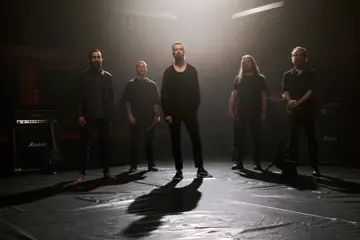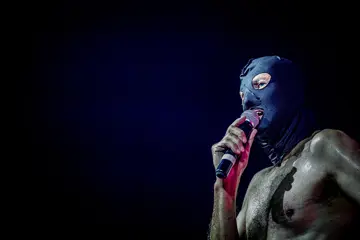When the current Minister for School Education decided to step off the Midnight Oil merry-go-round to stand as the Labor Member for Kingsford Smith, the rest of the band had a few choices – stick together in some form or go their separate ways. Initially they dispersed, bass player Bones Hillman eventually heading to Nashville and reinventing himself as a country music stand-up bass sessioneer, while drummer Rob Hirst threw himself more fully into The Backsliders and guitarist Jim Moginie launched a solo career with an underrated debut album, 2006's Alas Folkloric. Fellow guitarist Martin Rotsey popped up in the brief Hirst/Dom Turner side project, Angry Tradesmen, but the germ of a more permanent reuniting of Moginie, Rotsey and Hirst came in November 2007 when, as Ebb Tide & The Shorebreakers, they participated in a benefit concert for country-rock violinist Wayne Goodwin, who passed away a year later. When their paths crossed once more with expat American now Tasmanian bass player Brian Ritchie – they'd originally met in his hometown Milwaukee on one of the Oils' US tours, sharing a tour manager with his band Violent Femmes –The Break was born.
A debut album, Church Of The Open Sky, was released in April 2010, establishing their template as an instrumental four-piece steeped in the sounds of '60s surf and 'space rock' with a dash of Spaghetti Western Morricone-style. Now comes Space Farm, which sees the trio returning to the bosom of multinational label, Sony Music, after their flirtation with Adelaide-based independent, Bombora Creative.
“[Label head] David Minear was an enormous supporter and lover of The Break,” Hirst explains, “and also has an incredible catalogue of surf bands and others on his label, but he and we felt we'd pretty much gone as far as we could with the relationship and Midnight Oil, as you know, has been with Sony since the Jurassic period of Oz Rock, so we rekindled the relationship there and they came to the party for the second album. In fact I just spoke to David this morning – he's still an incredible supporter of the band, he loves what we've done on Space Rock, and he can't wait for us to come and tour South Australia.”
As the title of the second album suggests, The Break have opted to explore more thoroughly the possibilities of space rock, with its attendant blippy synthesiser sounds and the now ubiquitous theremin, deftly employed by Moginie. So how did this collection of tunes, which also includes the obvious not remotely space rock opening and closing chants courtesy The Gyuto Monks Of Tibet, come together?
Don't miss a beat with our FREE daily newsletter
“As usual,” Ritchie begins, sporting the most absurd 'space glasses' one could want, the others apologising for not fronting attired in the astronaut gear they wear on the CD cover, “we went into Jim's studio, Oceanic, and started jamming out a few basic drum grooves or bass riffs or guitar licks and then we just latch onto each other like barnacles and tumble through turbid adams until we have a song.”
“The Buddhist monks,” Hirst chips in, tongue firmly in cheek, “they just turned up in a beaten-up old Volvo stationwagon, and we were told, 'Oh, the monks are here, so we should give them some green tea.' When they'd had the green tea they all sat in Jim's studio, down there on the Northern Beaches, and it was explained to them the theme of the album, and they selected a particular work, and they chanted beautifully for about half an hour. We all took a few photos, exchanged a few gifts, they got back into the Volvo and off they went.
“So that the way this album was made – it was just happenstance. Whoever was passing by the studio or … Just this strange, eclectic, make it up as you go along kind of thing.”
“We just get together periodically and create new things,” Ritchie continues, “and when we have enough for an album we say, 'Okay, this is the album.' This time it took us a little while to realise that we really wanted to go in the space direction. We were already headed there but it took a while acknowledge that to ourselves, and once we had that planned, that's when everything got tied up in a nice new package.”
Essentially instrumental, Brian Ritchie is the mostly non-verbal “voice” of the band.
“I love being the lead singer in an instrumental band,” he laughs. “Not a lot to remember,” as he gleefully growls “Space Farm”, then his low, rumbling “Ooooooh” – “that's about the repertoire. Very nice – it's the easy job.”
“But it's just the way you do it,” Hirst points out before Moginie reminds us though that they have been working with singers, dropping the name of the iconic '60s romantic balladeer, Englebert Humperdinck, who began life as plain old Arnold Dorsey back in 1936 – yes, he's 77 and still touring, returning to perform in Sydney, Newcastle and Perth in July as it happens.
“We've just toured with Rodriguez [at this year's Bluesfest and his sideshows] and Dan Sultan. We might be an instrumental band but that doesn't mean we reject singers as such. We actually quite like singers.”
“The Monks are ageless,” Ritchie adds, before Moginie points out that “Dan's a bit of a problem.” Ritchie points out that “Dan has wisdom beyond his years – that's how he fits into the scheme.”
“My wife is from Sri Lanka,” Ritchie begins his explanation of how Humperdinck ended up featuring on the album, “and she was one of the spearheads of the Englebert Humperdinck fanclub back in the '60s and '70s there, so when I saw that he was coming to Melbourne [a couple of years ago], I said, 'Okay honey, I'm going to fly you up to Melbourne to see Englebert,' and I posted on Facebook, 'Going to see Englebert tonight,' and immediately,” he snaps his fingers, “a journalist commented on that post and said, 'I'm in the dressing room with Englebert right now. He wants to meet you, come backstage.'
“So we went backstage and it was great. You know, we had a little wine and chatted quite a bit, and one of the things we chatted about was the song, [1967 B-side] Ten Guitars, because it had been a massive, massive hit in Sri Lanka, and I knew from my experiences in New Zealand that it's the national anthem in New Zealand. At that point I suggested to Englebert, 'Why don't we do a remake of Ten Guitars?' 'Why would we want to do that?'” Ritchie laughs, was Humperdinck's response. “But then he did go along with it, once we'd actually presented him with the track, and now we're really happy with it. He hasn't lost any of his range or any of his tone – it's really remarkable.”















